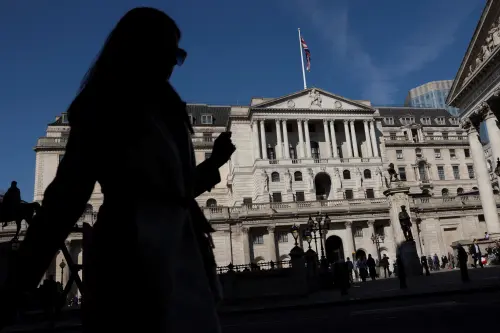With the Federal Reserve's meeting completed, the focus now shifts to several European central banks—the Bank of England, the Swiss National Bank, and the Riksbank—who are set to announce their interest rate decisions later today.
The Bank of England is anticipated to keep rates on hold as it assesses the economic effects of the recent U.S. tariff measures and the British government's upcoming tax increase for employers. UK inflation remains stubbornly above the 2% target, and the Bank of England has reduced borrowing costs less aggressively than both the European Central Bank and the Federal Reserve since last summer, contributing to sluggish growth in the country.
Before these announcements, investors will receive UK wage data, with expectations for annual pay growth, excluding bonuses, to remain steady at 5.9% for the three months leading to January.
The Swiss National Bank is also expected to maintain its current rate on Thursday, while economists predict a quarter percentage point increase in its main policy rate, which may remain in place until at least 2026.
Former President Trump commented on Fed policy, suggesting that interest rate cuts would commence "as U.S. tariffs start to transition into the economy," shortly after the Fed had decided to leave rates unchanged. Fed Chair Jerome Powell noted that Trump's previous policies, including substantial import tariffs, seem to have steered the U.S. economy towards slower growth and temporarily higher inflation, although policymakers still forecast two rate cuts this year.
Despite concerns regarding the U.S. economic outlook, investors are focusing on the potential for further easing from the Fed, boosting stocks in Asia on Thursday. Meanwhile, Europe is set for a mixed opening, with EUROSTOXX 50 futures up 0.07% and FTSE futures down 0.14%.
Geopolitical issues also remain at the forefront of investors' attention. Israel’s military reported a missile launched from Yemen amid escalating hostilities with the Houthis, while Trump threatened to penalize Iran for its perceived support of the Yemeni militant group.
The rising tensions in the Middle East have driven oil prices higher, with Brent crude futures up 0.55% and U.S. crude futures gaining 0.46%. However, potential Russian supply returning to the market could offset these gains, as Ukrainian President Volodymyr Zelenskiy indicated that a resolution to the conflict with Russia could be achieved swiftly.
On Wednesday, Trump and Zelenskiy agreed to collaborate in ending Russia's war with Ukraine during what the White House described as a productive one-hour phone call.
Key developments that may influence markets on Thursday include:
- Policy decisions from the Bank of England, Swiss National Bank, and Riksbank - UK wage data for January
